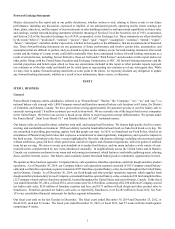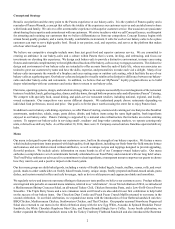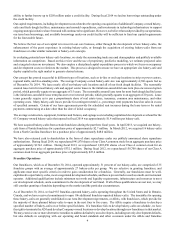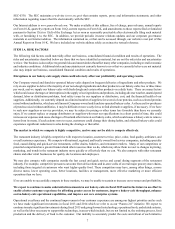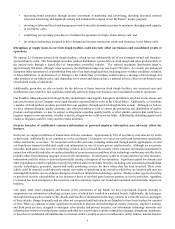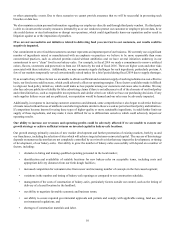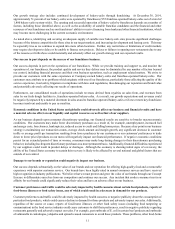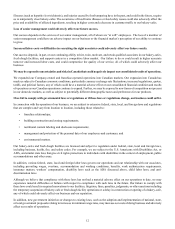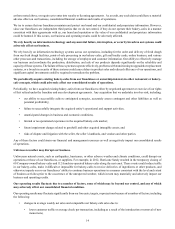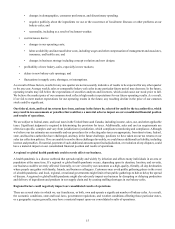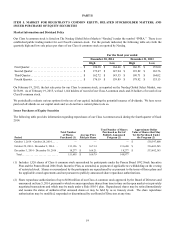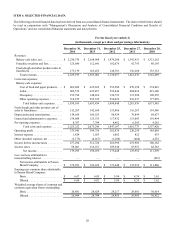Panera Bread 2014 Annual Report Download - page 22
Download and view the complete annual report
Please find page 22 of the 2014 Panera Bread annual report below. You can navigate through the pages in the report by either clicking on the pages listed below, or by using the keyword search tool below to find specific information within the annual report.10
or other catastrophic events. Due to these scenarios we cannot provide assurance that we will be successful in preventing such
breaches or data loss.
We also maintain certain personal information regarding our employees directly and through third party vendors. If a third party
is able to circumvent the security measures intended by us or our vendors to protect our customer or employee private data, he or
she could destroy or steal information or disrupt our operations, which could significantly harm our reputation and/or result in
litigation against us or the imposition of penalties.
If we are not successful in our initiatives related to delivering food you can trust to our customers, our results could be
negatively impacted.
Our commitment to serve food that customers can trust represents an important part of our business. We currently use a significant
number of ingredients raised or manufactured with an emphasis on practices we believe to be more responsible than some
conventional practices, such as selected proteins raised without antibiotics and we have several initiatives underway in our
commitment to serve “clean” food in our bakery-cafes. For example, in fiscal 2014 we made a commitment to remove artificial
colors, flavors, sweeteners and preservatives from our US menu by the end of fiscal 2016. There are higher costs and other risks
associated with these initiatives. Additionally, we may encounter supply challenges for such ingredients, particularly proteins. A
few of our markets temporarily served conventionally raised turkey for a brief period during fiscal 2014 due to supply shortages.
If, as a result of any of these factors we are unable to obtain a sufficient and consistent supply of such ingredients on a cost-effective
basis, our food costs could increase, which could adversely affect our operating margins. These factors could also make it difficult
to align our food policy initiatives, which could make us less popular among our customers and cause sales to decline. We may
also face adverse publicity or liability for false advertising claims if there is not adherence to all of the elements of our food policy
and related initiatives, such as responsible meat protocols and similar criteria on which we base our purchasing decisions. If any
such supplier failures occur and are publicized, our reputation would be harmed and our sales may be adversely impacted.
Additionally, in response to increasing customer awareness and demand, some competitors have also begun to advertise their use
of meats raised without the use of antibiotics and other ingredients similar to those we seek as part of our food policy and initiatives.
If competitors become known for using these types of higher-quality or more sustainable ingredients, it could further limit our
supply of these ingredients, and may make it more difficult for us to differentiate ourselves which could adversely impact our
operating results.
Our ability to increase our revenues and operating profits could be adversely affected if we are unable to execute our
growth strategy or achieve sufficient returns on invested capital in bakery-cafe locations.
Our growth strategy primarily consists of new market development and further penetration of existing markets, both by us and
our franchisees, including the selection of sites which will achieve targeted returns on invested capital. The success of this strategy
depends on numerous factors that are not completely controlled by us or involve risks that may impact the development, or timing
of development, of our bakery-cafes. Our ability to grow the number of bakery-cafes successfully will depend on a number of
factors, including:
• obstacles to hiring and training qualified operating personnel in the local market;
• identification and availability of suitable locations for new bakery-cafes on acceptable terms, including costs and
appropriate delivery distances from our fresh dough facilities;
• increased competition for restaurant sites from newer and increasing number of concepts in the fast casual segment;
• variations in the number and timing of bakery-cafe openings as compared to our construction schedule;
• management of the costs of construction of bakery-cafes, particularly factors outside our control, such as the timing of
delivery of a leased location by the landlord;
• our ability to negotiate favorable economic and business terms;
• our ability to secure required governmental approvals and permits and comply with applicable zoning, land use, and
environmental regulations; and
• shortages of construction materials and labor.



